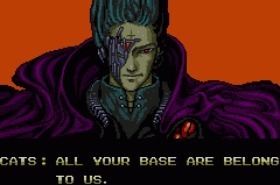Getting serious about video games
By Peter Bacon
Best Defense department of video reality

Video games have somewhat of a bad
reputation today: individuals have attacked games for their supposed
contribution to obscenity
and their debilitation
of male virtue. Despite these fears, scientists have identified some
benefits from gaming, ranging from improved
self-worth to augmented
surgical skills. In the foreign policy arena, video games can and should
serve as a powerful tool for educating civilian and military personnel about
war and foreign affairs.
Video games can serve to help bolster America's glaring
deficiency in one crucial discipline: history. Video games focused on war
and IR provide refreshing bursts of information about often-overlooked leaders
and wars. These games can offer descriptive backgrounds of leaders or events
(e.g. Age of Empires' description
of Genghis Khan or the Crusades). These methods can sometimes provide a deeper
and more-engaging understanding of history than just a textbook or lecture.
A subgenre of games, so-called "serious" games, goes further
by explicitly trying to educate gamers about historical or political issues.
For example, Niall Ferguson in 2007 played the World War II serious game Making
History and played out some of his WWII counterfactual scenarios, such
as war breaking out over German seizure of Czechoslovakia in 1938. His
experience led him to conclude that his counterfactual historical scenarios "weren't
as robust as [he] thought." As a result, Ferguson ended up advising this
series. This episode, forcing critical re-examinations of events, anecdotally
illustrates the range of useful educational experiences gleaned from games like
Making History or other, current
games such as Global Conflicts: Palestine
or the future-themed Fate of the World: Tipping
Point that can help civilians better understand history and
policymaking, thereby making better choices when voting or arguing politics.
All of the above is great for civilians, but what about
actual warfighters and policymakers? Games cannot finely simulate actual combat
or crises, yet can provide training related to the planning and responses
needed for tactical and strategic decisions. Indeed, military officers have
engaged in a modern form of Kriegsspiel
by using tactical warfare games for their training: for example, the Close Combat series proved so popular
that in 2004 the developer released Close
Combat: Marines explicitly for military training. Other games, such as the
tank-simulator Steel Beasts or
the situational training tools of WILL
interactive, have been used by the military for realistic simulations of
warfighting and decision-making.
Civilian practitioners, however, have not embraced gaming as
readily as the military: while think tankers or civilian politicians outside
the Pentagon may play games in an unofficial capacity, official efforts like
the Woodrow Wilson Center's Serious
Games Initiative have petered out. In stark contrast, DOD policy
practitioners embrace video games even in non-kinetic planning: Michael
Peck's article on a DOD budgeting game shows how policymakers can prepare
for things as prosaic as the budget with games. Hopefully civilian policymakers
in the future will use games, both serious, educational games and fun strategy
games, to prepare for the decision-making necessary during times of crisis.
Thomas E. Ricks's Blog
- Thomas E. Ricks's profile
- 436 followers



